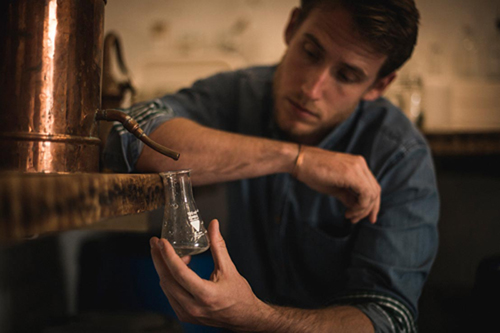
Meet the people who turned their passion into profit
In the old days people just stuck at their jobs whether they liked them or not – for the security, the tradition and for the reason that simply, without the internet, being an entrepreneur was far more difficult.
Now, with connectivity, access to market is now easier than ever. As a result, working for yourself is increasingly popular. Last month’s latest figures, which compare April to June 2016 with the same period from the previous year, show the number of self-employed people increased by 257,000 to 4.8 million (that’s 15% of all people in work) and it’s growing each month.
As this is a topic close to my heart, I’ve been speaking to some clever folk who were unhappy in their 9-5 roles and so turned their passion into highly profitable business ventures.
Read the full Huffington post article here.
Reuben May, now aged 35, enjoyed a blissful life in his youth, working as a surfing instructor and beach life guard on Newquay beach, Cornwall. However a severe back injury meant that overnight he could no longer surf and so lost his livelihood and passion. In constant pain and unable to walk properly, Reuben moved back to Bournemouth to live with his mum and study occupational therapy.
Early into his studies, Reuben was struck down with Myalgic Encephalopathy (ME) and found himself housebound with lethargy and further pain. Life was a constant struggle. He managed to complete his degree but needed a new way of getting fit and back in to the water and so he looked into buying a stand up paddleboard (SUP) – a gentle alternative to surfing.
However Reuben found the boards sold by the big SUP brands were over-priced, and so he talked to the manufacturers direct. He was able to buy the same boards sold by the large brands for much less and so placed an order for ten. Impressed with the quality, Reuben kept two for him and his wife and sold the rest to friends and on eBay. The boards sold very quickly. Reuben had found a market. He set up his own company FatStick, built a site, designed a logo, and he hasn’t looked back.
Since immersing himself in a sport and business he is totally passionate about, Reuben’s ME has significantly improved. His business is highly successful and he sees stand up paddle boarding as essential to his recovery, as well as his family’s income.
Reuben says: “When I was studying to be an occupational therapist, I thought I was doing something worthwhile, but it was simply incongruous to me and my lifestyle. Now, I am working in an industry I love. Being my own boss in Dorset means I can work as hard as I can when I need to, but also enjoy time off with my family, or on the water, during the slower periods.”

Annie Ross, founder of EXerK and an Evening Standard columnist, is passionate about grassroots sport. Last year, alongside a full-time job in finance, she started out on a mission to complete 52 sporting challenges in 52 weeks. She says it was a true test of endurance, with over 450 people joining her too. She completed her mission and has recently moved to South America for eight months to work on the Colombia Marathon – a running event that also makes a positive social impact. After 55 years of war, Colombia is at peace; the marathon’s organisers are working with UN Global Goals to reduce inequalities, help create and support sustainable communities and sustains peace, justice and institutions along its route. Annie has successfully combined her hobby with a livelihood that makes a difference to people’s lives. She ends her days exhausted but fulfilled.
Another local example is Rupert Holloway from Conker Spirit (you have no idea how excited I was to discover my hometown Southbourne, has its own gin company). Rupert was an unhappy desk-bound quantity surveyor who took a flying leap into the unknown to start up his own spirit company. He started from scratch, meticulously tweaking the recipe to his Dorset Dry. Rupert says that there’s no ancient family formula; he’s no mythical Master Distiller. He just has a dogged pursuit of the new and exciting.

Rupert says: “Changing my attitude towards money was one of the single most important steps I took towards leaving my nine-to-five and launching my own venture. I don’t mean that I no longer wanted to earn good money and have nice things, it was more basic than that. Money in itself has no value – it’s an unfulfilling and futile motivation for your work.” Rupert has found that, by demoting the value of money, his fresh approach to gin has turned Conker into a highly profitable business.
Star Khechara, who trains people to monetise their own brands through doing what they love says: “Some people even struggle finding out what their passion is. The golden key is to ask “what is the one thing you already do that you would do even if no-one paid you?”
Celebrity brand strategist Phil Pallen says that a strong brand consists of two key elements; what you love doing PLUS what others need. Building a brand on your passion, be that personal or corporate, makes it personal, relatable to others and most importantly, genuine.
As for me, I wasn’t happy in my stable 9-5 job (although you never work just those hours, do you?). I’d wanted to go freelance for years, and so used the maternity leave for my first child to create my business plan. I taught myself how to build my website, spending long evenings learning about shortcodes, plugins and widgets. Now I have a business I absolutely love, on the coast of a beach resort I’m equally proud of.
I’m passionate about getting results for my clients. To get a spread in a well-read publication, whether national or regional, a consumer lifestyle or niche B2B magazine makes me happy.
I also enjoy working pro bono for a charity I feel most passionately about – CalAid, which helps refugees in Calais, Turkey and Greece.
It’s vital to be able to do what you enjoy in your job, whether you’re a business owner or an office-worker who represents a small cog in a large corporate mechanism.
Absorbing your passion into your everyday working life doesn’t mean you need to jack in your job and sell the house. Instead, you can do small things to help enhance your life – asking your boss if you can work on a project or with team you’re interested in. You can volunteer your time for a cause that interests you, make time for your lifelong hobby (or start a new one), pursue the type of clients that interest you personally, or build your own community either online, or well… in your community. The beauty of doing what you love is that it doesn’t feel like work.
As Conker’s Rupert Holloway says: “The concept of a single career ladder is flawed. Instead it will be a series of ladders and snakes, hops and leaps of faith as you make your way to the next rung that feels like your next best move. Trusting your gut rather than a perceived obligation to see it through, and crucially, not viewing each previous ladder as a waste of time.”
Reuben, Annie and Rupert offer lessons to us all. Whether we are looking to start out by ourselves or we’re happy working in an organisation – the entrepreneurial spirit is vital to business. It’s about doing what you love, taking risks and doing things just a bit differently.

